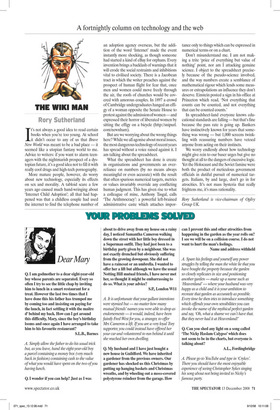THE WIKI MAN
Rory Sutherland
It’s not always a good idea to read certain books when you’re too young. At school it didn’t occur to any of us that Brave New World was meant to be a bad place — it seemed like a utopian fantasy world to me. Advice to writers: if you want to alarm teenagers with the nightmarish prospect of a dystopian future, it’s a good idea not to fill it with really cool drugs and high-tech pornography.
More mature people, however, do worry about new technology, especially its effects on sex and morality. A tabloid scare a few years ago caused much hand-wringing about ‘Internet Child Adoption’; all that had happened was that a childless couple had used the internet to find the telephone number of an adoption agency overseas, but the addition of the word ‘Internet’ made the event instantly more shocking, as though someone had started a kind of eBay for orphans. Every invention brings a backlash of warnings that it will erode the social restraints and inhibitions vital to civilised society. There is a Jacobean tract in which the writer preaches against the prospect of human flight for fear that, once men and women could move freely through the air, the roofs of churches would be covered with amorous couples. In 1897 a crowd of Cambridge undergraduates hanged an effigy of a woman opposite the Senate House to protest against the admission of women — and expressed their horror of liberated women by sitting the effigy on a bicycle (http://snipurl. com/newnham).
But are we worrying about the wrong things here? While we all agonise about moral issues, the most dangerous technology of recent years has spread without a voice raised against it. I am talking about the spreadsheet.
What the spreadsheet has done is create in organisations and governments an overreliance on numbers (by no means always meaningful or even accurate) with the result that often spurious numerical targets, metrics or values invariably override any conflicting human judgment. This has given rise to what a colleague of mine, Anthony Tasgal, calls ‘The Arithmocracy’: a powerful left-brained administrative caste which attaches impor tance only to things which can be expressed in numerical terms or on a chart.
Don’t misunderstand me. I am not making a trite ‘price of everything but value of nothing’ point, nor am I attacking genuine science. I object to the spreadsheet precisely because of the pseudo-science involved, and the way numbers create a semblance of mathematical rigour which lends some measures or extrapolations an influence they don’t deserve. Einstein posted a sign in his office at Princeton which read, ‘Not everything that counts can be counted, and not everything that can be counted counts.’ In spreadsheet-land everyone knows educational standards are falling — but that’s fine because the pass rate is going up. Bankers have instinctively known for years that something was wrong — but 1,000 screens twinkling with reassuring numbers have vetoed anyone from acting on their instincts.
We worry endlessly about how technology might give rein to our baser urges but give no thought at all to the dangers of excessive logic. Yet the Holocaust and the Soviet famine were both the product of meticulous government officials in dutiful pursuit of numerical targets. Italians, by and large, don’t go in for atrocities. It’s not mass hysteria that really frightens me, it’s mass rationality.










































































 Previous page
Previous page